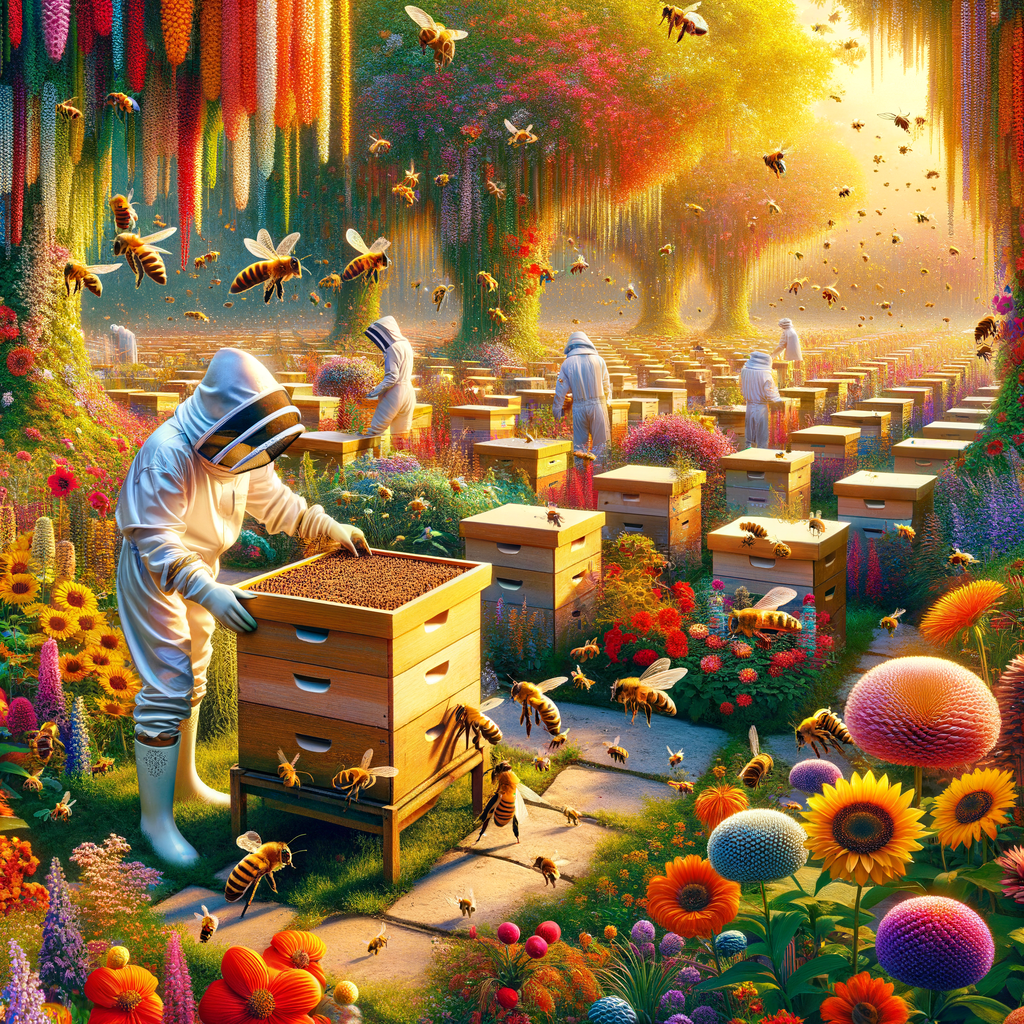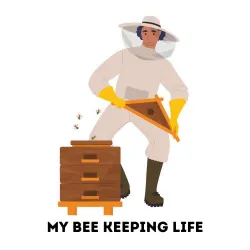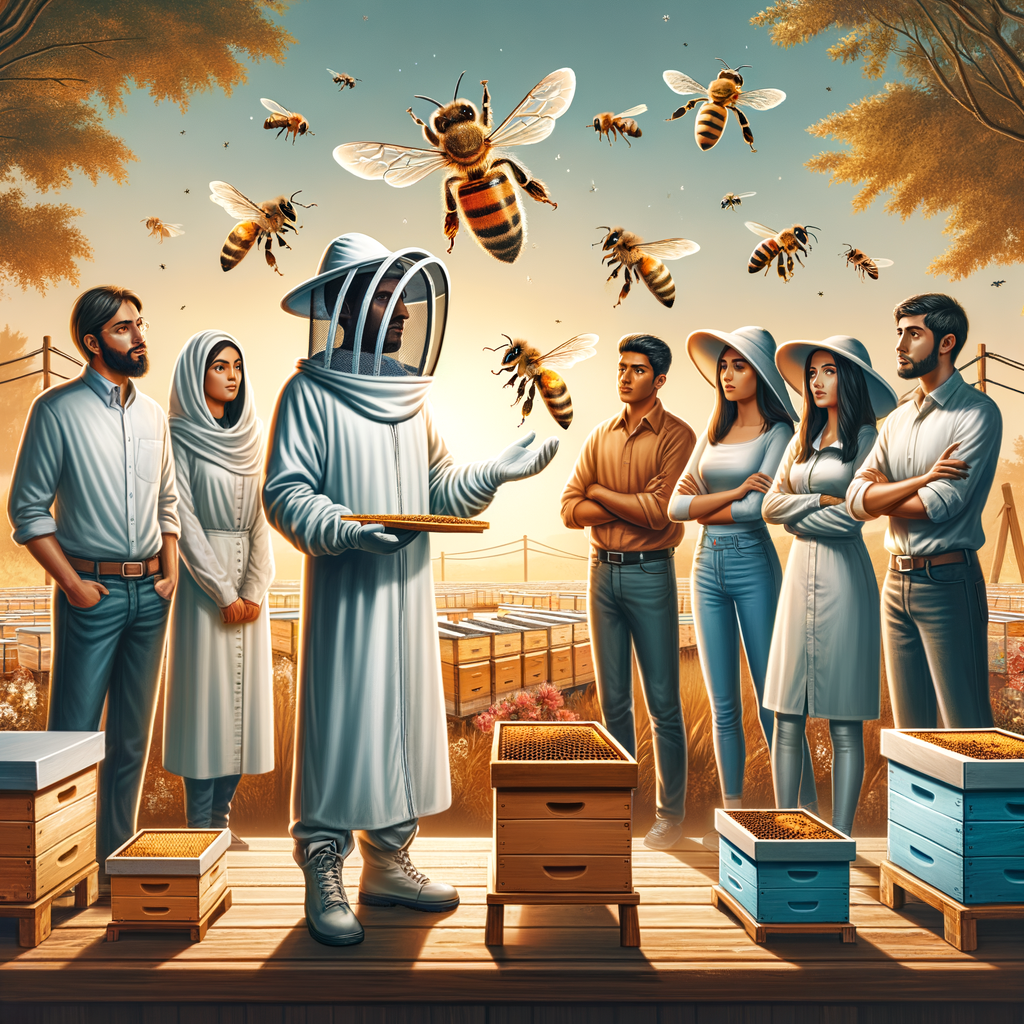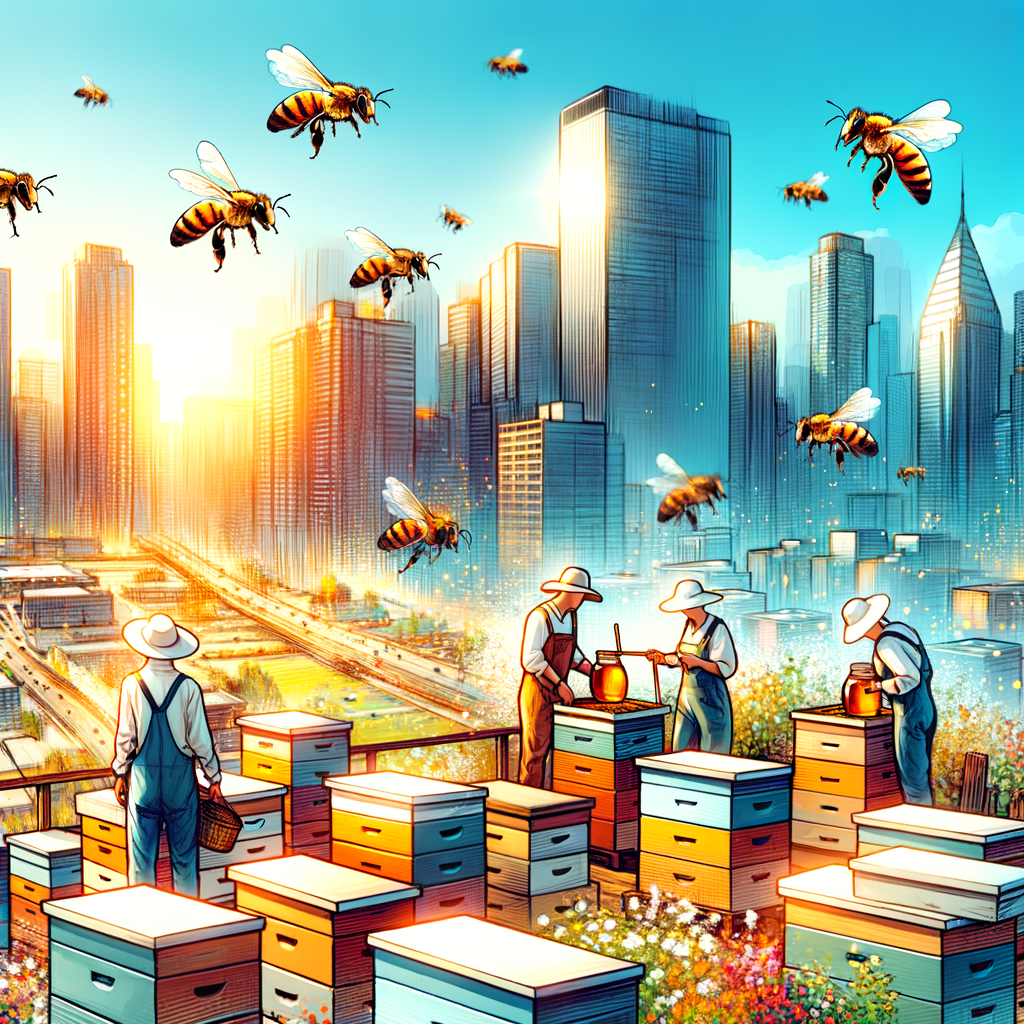
Introduction to Beekeeping and Biodiversity
Understanding the world of bees and their role in maintaining biodiversity is a fascinating journey. Let’s begin by defining some key terms.
- Definition of Beekeeping
- Definition of Biodiversity
- The Link Between Beekeeping and Biodiversity
Beekeeping, also known as apiculture, is the practice of maintaining bee colonies. This is usually done in man-made hives. Beekeepers, also known as apiarists, manage bees to collect their honey and other products like beeswax, pollen, and royal jelly. Beekeeping also helps in pollinating crops, which is crucial for our food supply.
Biodiversity refers to the variety of life on Earth. It includes all organisms, species, and populations; the genetic variation among these; and their complex assemblages of communities and ecosystems. Biodiversity is important because each species can play a unique role in the functioning of an ecosystem.
Beekeeping and biodiversity are closely linked. Bees play a vital role in pollinating plants, which is crucial for biodiversity. By transferring pollen from the male parts of a flower to the female parts, bees help plants reproduce. This results in a diverse array of plants and crops. Without bees, many plants, including food crops, would struggle to reproduce. Therefore, beekeeping can be seen as a way to support and enhance biodiversity.
In the following sections, we will delve deeper into the importance of beekeeping, its benefits, and its impact on the environment. We will also discuss sustainable beekeeping practices and look towards the future of beekeeping and biodiversity.
The Importance of Beekeeping
Beekeeping, also known as apiculture, plays a significant role in our ecosystem. It’s not just about honey production; it’s about maintaining the balance in nature. Let’s delve into the role of bees in our ecosystem.
Role of Bees in the Ecosystem
Bees are vital to our environment. They perform several roles that contribute to the health and diversity of our ecosystem. Here are some of the key roles they play:
- Bees as pollinators: Bees are nature’s most efficient pollinators. As they move from flower to flower in search of nectar, they carry pollen on their bodies, facilitating the process of pollination. This process is crucial for the reproduction of many plant species.
- Bees and food production: Bees are essential for food production. It is estimated that one-third of the food we consume each day relies on pollination mainly by bees. This includes fruits, vegetables, and nuts, among other types of food.
- Bees and plant diversity: By pollinating a wide variety of plants, bees contribute to plant diversity. This diversity is essential for a healthy and resilient ecosystem. It helps to prevent the dominance of a single species and promotes a wide range of habitats for other wildlife.
In conclusion, bees play a vital role in our ecosystem. Their contribution to pollination, food production, and plant diversity is invaluable. Beekeeping, therefore, is not just a hobby or a business; it’s a practice that supports the health and diversity of our environment.
Beekeeping as a Sustainable Practice
Beekeeping is not just a hobby or a commercial activity. It is a sustainable practice that plays a significant role in our environment and agriculture. Let’s explore how beekeeping contributes to sustainable agriculture and the role of beekeepers in bee conservation.
- How Beekeeping Contributes to Sustainable Agriculture
- The Role of Beekeepers in Bee Conservation
Beekeeping is a key player in sustainable agriculture. Bees are nature’s little helpers, working tirelessly to pollinate our crops. This pollination is vital for the growth of many of our favorite fruits, vegetables, and nuts. Without bees, our food production would significantly decrease.
Did you know that bees are responsible for pollinating about one-third of the food we eat? That’s a big job for such small creatures! By keeping bees, we help ensure that our food supply is sustainable. We also help to maintain biodiversity in our environment, as bees pollinate a wide variety of plants, not just our food crops.
Beekeepers play an essential role in bee conservation. They provide bees with a safe and nurturing environment, free from predators and harmful pesticides. Beekeepers also monitor the health of their bees and take action if they notice any signs of disease or stress.
By keeping bees, beekeepers are helping to increase the population of these important pollinators. This is especially important because bees are facing many challenges, including habitat loss, disease, and climate change. Beekeepers are on the front lines of bee conservation, doing their part to ensure that these valuable creatures continue to thrive.
In conclusion, beekeeping is a sustainable practice that contributes significantly to our agriculture and helps conserve our precious bee populations. So, the next time you enjoy a juicy apple or a handful of almonds, remember to thank a beekeeper!
Benefits of Beekeeping
Beekeeping is not only a rewarding hobby but also offers numerous benefits. One of the key advantages is the economic value it brings. Let’s delve into the economic benefits of beekeeping.
Economic Benefits
One of the main economic benefits of beekeeping is the potential for income generation. This can be achieved through honey production and sales, as well as through the market value of bee-related products.
- Honey Production and Sales
- Bee-Related Products and Their Market Value
Bees produce honey, which is a highly sought-after product. Honey is not only delicious but also has numerous health benefits. As a beekeeper, you can harvest this honey and sell it for profit. The demand for natural, raw honey is high, and it often fetches a good price in the market. According to the National Honey Board, the retail price for honey in 2020 averaged $7.66 per pound, indicating a lucrative market.
Beyond honey, bees produce other valuable products. These include beeswax, royal jelly, and propolis. Beeswax is used in a variety of products, including candles, cosmetics, and food. Royal jelly is a substance produced by worker bees and is often used in health supplements and beauty products. Propolis, a resin-like material, has medicinal properties and is used in various health products. These bee-related products have a significant market value, providing additional income opportunities for beekeepers.
In conclusion, beekeeping offers substantial economic benefits. By harnessing the products that bees naturally produce, beekeepers can generate a steady income. This makes beekeeping not only an environmentally friendly practice but also a financially rewarding one.
Environmental Benefits
When we think about the benefits of beekeeping, we often think about honey and other bee-related products. However, beekeeping also has significant environmental benefits. Let’s explore these benefits in detail.
- Enhancement of Local Flora
Bees play a crucial role in the pollination of plants. As they move from flower to flower, they carry pollen, which helps plants reproduce. This process enhances the growth and diversity of local flora. For example, a study showed that in areas where beekeeping was practiced, there was a 45% increase in the number and variety of flowers.
- Improvement of Crop Yields
Bees are nature’s most efficient pollinators. They help increase crop yields by transferring pollen from the male parts of a flower to the female parts, facilitating fertilization. This process leads to the production of fruits and seeds. According to the United Nations Food and Agriculture Organization, bees help increase crop yield by up to 24% in small-scale farming scenarios.
- Contribution to Biodiversity
By enhancing local flora and improving crop yields, bees contribute to biodiversity. They support the growth of various plants, which in turn provide habitats for a wide range of wildlife. Furthermore, the honeybee itself is a part of our planet’s biodiversity. By keeping bees, we help maintain the balance of our ecosystems.
| Environmental Benefit | Explanation | Example |
|---|---|---|
| Enhancement of Local Flora | Bees carry pollen from one flower to another, helping plants reproduce. | 45% increase in the number and variety of flowers in areas with beekeeping. |
| Improvement of Crop Yields | Bees transfer pollen within flowers, leading to the production of fruits and seeds. | Up to 24% increase in crop yield in small-scale farming scenarios. |
| Contribution to Biodiversity | Bees support the growth of various plants, providing habitats for wildlife and maintaining ecosystem balance. | Areas with active beekeeping have a richer biodiversity. |
In conclusion, beekeeping is not just about honey production; it’s also about supporting our environment. By keeping bees, we can enhance local flora, improve crop yields, and contribute to biodiversity.
Beekeeping and the Environment
Beekeeping plays a significant role in our environment. It not only provides us with honey and other bee products but also contributes to the biodiversity of our planet. Let’s explore how beekeeping impacts biodiversity and learn from some successful practices.
Impact of Beekeeping on Biodiversity
Biodiversity refers to the variety of life on Earth, from the smallest microorganisms to the largest mammals. Beekeeping, or apiculture, directly impacts this biodiversity. Bees are crucial pollinators, meaning they help plants reproduce. Without bees, many plants, including food crops, would struggle to survive. Let’s look at some case studies that show how successful beekeeping practices can enhance biodiversity.
- Case studies of successful beekeeping practices
- Key takeaways from these case studies
One example of successful beekeeping is found in the Netherlands, where a program called “Bee Landscape” was launched. This initiative aimed to increase the bee population by creating bee-friendly environments. They planted wildflowers and set up bee hotels, providing bees with plenty of food and shelter. The result? The bee population increased, and so did the variety of plants in the area.
Another case study comes from Brazil, where farmers have integrated beekeeping with sustainable farming practices. They’ve found that having bees on their farms increases crop yields because of better pollination. Plus, they get the added benefit of producing honey!
These case studies teach us that successful beekeeping can enhance biodiversity in several ways. First, it helps increase the bee population, which is essential for pollination. Second, it can lead to a greater variety of plants, as we saw in the Netherlands. Lastly, it can boost crop yields, as demonstrated in Brazil.
In conclusion, beekeeping has a significant positive impact on biodiversity. By adopting successful beekeeping practices, we can contribute to a healthier and more diverse planet.
Bee Conservation and Biodiversity
Bees play a pivotal role in maintaining the balance of our ecosystem. Their conservation is crucial to preserving biodiversity. In this section, we will discuss the threats that bees face and how beekeeping can contribute to their conservation.
- Threats to bees and their impact on biodiversity
Bees are under threat from various factors, including habitat loss, climate change, pesticides, and diseases. These threats have a significant impact on biodiversity. Bees are key pollinators, and their decline can lead to a decrease in the variety of plants and crops, which in turn affects the animals that depend on those plants for survival. According to a report by the United Nations, 75% of the world’s food crops depend to some extent on pollination, highlighting the crucial role bees play in our ecosystem.
- How beekeeping helps in bee conservation
Beekeeping, also known as apiculture, is a practice that can help in bee conservation. By creating a safe and controlled environment for bees, beekeepers can protect them from threats and ensure their survival. Beekeeping also allows for the monitoring of bee health, enabling early detection and treatment of diseases. Furthermore, beekeeping promotes biodiversity by increasing the number of bees, which leads to more pollination. In fact, a study published in the Journal of Applied Ecology found that managed honey bees can enhance pollination services, leading to an increase in crop yield.
| Threats to Bees | Impact on Biodiversity | Role of Beekeeping |
|---|---|---|
| Habitat loss, climate change, pesticides, diseases | Decrease in variety of plants and crops, affecting animals that depend on those plants | Provides a safe and controlled environment, promotes biodiversity by increasing number of bees |
In conclusion, bees are essential for biodiversity, and their conservation through practices like beekeeping is crucial for the health of our planet.
Sustainable Beekeeping
As we delve deeper into the world of beekeeping, it’s crucial to understand the importance of sustainability. Sustainable beekeeping is a practice that promotes the health and survival of bee colonies, while also protecting their natural habitats. Let’s explore some of the best practices for sustainable beekeeping.
Practices for Sustainable Beekeeping
There are two main practices that are essential for sustainable beekeeping: responsible management of bee colonies and protection of bee habitats.
- Responsible Management of Bee Colonies
- Protection of Bee Habitats
Responsible management of bee colonies is a fundamental aspect of sustainable beekeeping. This involves regular health checks, providing adequate food and water, and ensuring the bees have enough space to grow and thrive. It’s also important to use natural, non-toxic substances to control pests and diseases. For instance, a study conducted by the University of California found that using organic methods to control Varroa mites resulted in healthier and more productive bee colonies.
Protecting bee habitats is another crucial practice for sustainable beekeeping. Bees need a diverse range of plants for foraging. Therefore, it’s important to avoid the use of pesticides and other harmful chemicals that can damage these plants and the soil. Moreover, preserving natural habitats like forests, meadows, and wetlands can provide bees with the diverse diet they need to stay healthy. For example, a case study in the UK showed that bee colonies located near wildflower meadows had a 20% higher survival rate compared to those in areas dominated by monoculture crops.
In conclusion, sustainable beekeeping is not just about keeping bees. It’s about creating a harmonious relationship with nature, where both bees and humans can benefit. By adopting responsible management practices and protecting bee habitats, we can ensure the survival of these vital creatures and the future of our planet.
Benefits of Sustainable Beekeeping
Sustainable beekeeping is not just a hobby or a profession. It is a commitment to the environment and biodiversity. Let’s delve into the benefits of sustainable beekeeping.
- Long-term benefits for the environment
- Contribution to biodiversity
Beekeeping, when done sustainably, has numerous long-term benefits for the environment. Bees play a crucial role in pollination, which is vital for the growth of plants and crops. By maintaining healthy bee colonies, we ensure the continuation of this natural process. This, in turn, contributes to the overall health of our ecosystems.
Moreover, sustainable beekeeping practices help in reducing the use of harmful pesticides. Many beekeepers opt for organic methods to keep their hives healthy, which is beneficial for the environment.
Lastly, beeswax, a by-product of beekeeping, is a sustainable alternative to many plastic-based products. From candles to cosmetics, beeswax is used in a variety of eco-friendly products, reducing our reliance on non-renewable resources.
Biodiversity is the variety of life on Earth, in all its forms and interactions. Bees contribute significantly to biodiversity by pollinating a wide range of plants, including many wildflowers and trees. This leads to the production of fruits, seeds, and nuts, which are food sources for many other species.
Furthermore, different species of bees prefer different types of flowers, contributing to plant diversity. By keeping bees, we are indirectly supporting a wide range of other species, from birds to mammals, which rely on these plants for food and habitat.
In conclusion, sustainable beekeeping is a practice that benefits not just us, but the entire planet. It’s a small step towards a healthier and more diverse world.
Conclusion: The Future of Beekeeping and Biodiversity
As we reach the end of our exploration into the world of beekeeping and its impact on biodiversity, it’s clear that the future of our planet and the bees are intertwined. The choices we make today will shape the world for generations to come.
- The ongoing importance of beekeeping for biodiversity
- How individuals can contribute to sustainable beekeeping
Beekeeping is not just a hobby or a profession; it’s a vital part of our ecosystem. Bees are responsible for pollinating nearly 70% of the world’s crops, contributing to biodiversity by helping plants reproduce. Without bees, our food system and the biodiversity of our planet would be at risk. As we move forward, it’s crucial that we continue to support beekeeping and educate others about its importance.
Every one of us can play a part in supporting sustainable beekeeping. This could be as simple as planting bee-friendly flowers in our gardens, reducing our use of pesticides, or even becoming amateur beekeepers ourselves. By making these small changes, we can collectively make a big difference to the future of bees and biodiversity.
In conclusion, the future of beekeeping and biodiversity is in our hands. The actions we take today will determine the health and diversity of our planet for years to come. As we’ve seen, beekeeping plays a crucial role in maintaining our ecosystem, and it’s up to us to ensure its survival. Let’s work together to create a sustainable future for beekeeping and biodiversity.
| Key Takeaways |
|---|
| Beekeeping is vital for biodiversity and our food system. |
| Individual actions can make a big difference in supporting sustainable beekeeping. |
| The future of beekeeping and biodiversity is in our hands. |








